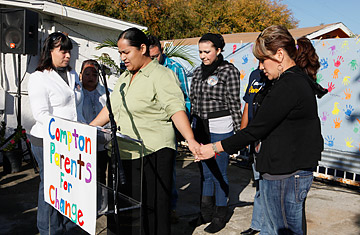
Parents of students from McKinley Elementary School hold hands in prayer on Dec. 7, 2010, before filing California's first "parent trigger" law to force the Compton Unified School District to make changes in its system
(2 of 2)
Now similar versions of California's law have been introduced in 14 other states. A version of the law that omits the option of turning a school over to a charter operator recently passed both houses of the Texas legislature. Nationally, Representative George Miller, the ranking Democrat on the House Education and the Workforce Committee, is closely following what is happening in the states. He says he has no plans to introduce federal legislation but that he has not ruled out the possibility of including the law as part of the reauthorization of No Child Left Behind (otherwise known as the Elementary and Secondary Education Act). "The fact of the matter is, when we look at developing a model for real change and improvement in public education, it's pretty hard to do without parents," Miller tells TIME. "We've tried for years, and it's not working."
But so far, no school has been shut down or successfully transformed. After the law passed in California, Parent Revolution targeted McKinley Elementary School — part of the Compton Unified School District in South Los Angeles, which serves students in kindergarten through fifth grade — and started to organize parents from the ground up.
One of those parents was Theresa Theus, whose 5-year-old daughter Tioni was in kindergarten at McKinley at the time. After looking at McKinley's test scores online, Theus didn't want to send her daughter there anymore, but she had no choice. She couldn't afford a private education, and the district told her there was no public alternative. "In sending her there, I felt like I was putting her at a disadvantage," Theus tells TIME. "I didn't want her falling behind."
Theus was an easy sell, and she in turn recruited other parents. That's how the model works: once you inspire one parent to act, you have them invite a handful of their friends. On Dec. 7, 2010 — with signatures from 275 of 438 parents, or roughly 61% — Parent Revolution filed a petition, thus pulling the parent trigger at a school for the first time in the nation.
The effort faced immediate opposition and legal challenges from the school board. While a judge ruled that parents who petition under the law are protected by the First Amendment, the petition may eventually be ruled invalid, as the signatures are not dated. The final decision on that will come within weeks. But while it faced its opponents in court, Parent Revolution started to get calls from parents and community organizers across the country, and it now advises other groups like Buffalo ReformED on how to pass their own trigger legislation.
In California, the most vociferous opposition came from those who oppose the charter-school provision. Randi Weingarten, president of the American Federation of Teachers, says she thinks the law will be misused to promote growth of charter schools. "When this legislation is being driven by parents, that's good," she says. "But when it's driven by a group of people whose sole mission is to open a charter school, that's bad."
But in Compton, Austin says, a charter school was the only option because of how persistently failing the entire district was. In the future, as the movement grows, Austin says, the majority of trigger campaigns will not be about converting to charter schools but about some of the law's other provisions, like firing the principal. "If the social justice end game is to serve all kids who are trapped in failing schools, you can't get there with just charter schools," Austin tells TIME. "We are completely agnostic as to whether kids are served with charter schools or other district schools. We just want all kids in good schools, and we want parents to have a seat at the table."
A seat at the table is exactly what Samuel Radford III of Buffalo wants. "When you're powerless, you recognize things that give you power," he says. "This law would give me the right to confront a principal, a teacher, a school board, and they don't get to say no. They can't turn me away. This puts the power in my hands to decide the destiny of my child."
